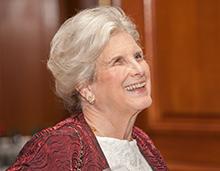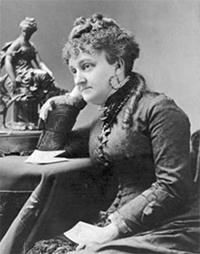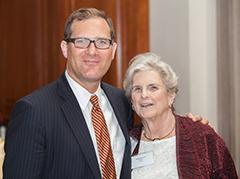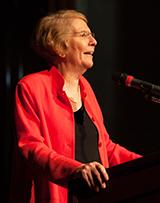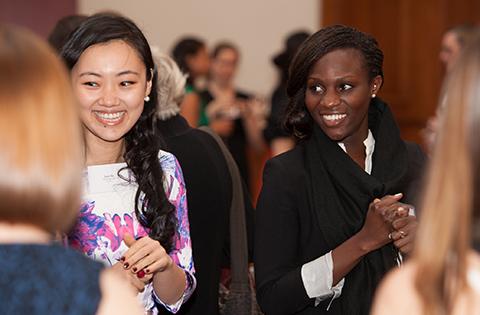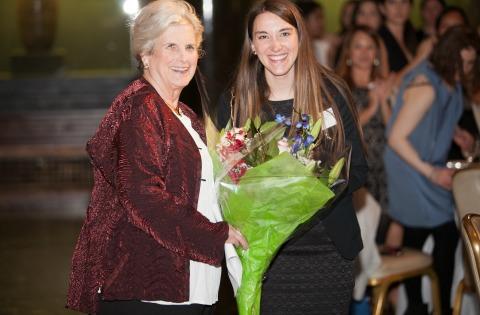Balancing Act
Human Rights Advocate and Distinguished Alumna Minna Schrag '75 Weighs in on Her Roles as Mother and Attorney
New York, April 16, 2014—Finding the right balance between work and family is a constant struggle, according to Minna Schrag ’75, one of the first senior trial attorneys at the International Criminal Tribunal for the former Yugoslavia (ICTY) and a leading human rights advocate, who received the Myra Bradwell Distinguished Alumna Award from the Columbia Law Women’s Association at the group’s 34th annual dinner on April 8.
| Minna Schrag '75 received the Myra Bradwell Distinguished Alumna Award. |
Schrag found great success as a federal prosecutor and in the private sector as a longtime partner at Proskauer Rose before becoming an advocate for justice in regions devastated by human rights violations. But at the dinner held in her honor, she shared some of the more personal anecdotes from her career, telling an audience of students, faculty, alumni, friends—and several members of her family—that each woman must find her own rhythm among myriad responsibilities.
“Don’t expect that you’ll find the perfect balance between life and work,” she said at the event in Columbia University’s Low Library. “It doesn’t exist. Keep on trying to find what works for you.”
| Myra Bradwell fought to be admitted to the Illinois state bar. |
The Myra Bradwell Award is named for a woman who was rejected by the Illinois Supreme Court in 1872 and the United States Supreme Court in 1873 in her bid to become the first female admitted to the Illinois state bar. In addition to honoring Schrag at its dinner, the Columbia Law Women’s Association named Shefali T. Singh ’14 the Myra Bradwell Note Winner for her piece about criminal prosecutions on Native American land.
Breaking Down Barriers
In 1973, a century removed from Bradwell, Schrag was a mother of three young children and a student at Columbia Law School, having enrolled a decade after graduating from Radcliffe College. One night, she told her kids that she was inviting some classmates over for dinner, listing the names of the women—and men—who would be attending.
When she finished, her 3-year-old son Jonathan (who then was attending the nursery school on 116th street where some other children had mothers at the Law School) looked up at her, befuddled, she recalled in her speech at the award dinner.
“But, mens can’t go to law school,” he said. “Only mommies can.”
Despite the gains for women during this time, Schrag still encountered challenges balancing her roles as a mother and attorney, facing skepticism from a mostly male profession and trying to live up to her own exceedingly high expectations. She said a male senior associate early in her career asked how she expected to do the work required of her with three children at home.
“I wouldn’t let my wife do that,” he said.
| The honoree with her son, Jonathan Schrag |
In her speech, Schrag said her work often “tipped the scales” and that her children ate more than their fair share of tuna fish and noodles (Jonathan, now a senior fellow in energy at NYU School of Law, was present at the ceremony and said his mother was being too hard on herself. He pointed out that he continues to love tuna fish.).
“I realized too late that I didn’t have to do everything all at the same time,” Schrag said. “Some of the projects and positions I undertook could have waited until my children were a little older.”
From Prosecutor to Human-Rights-Advocate
After law school, Schrag worked for six years as a federal prosecutor in the Southern District of New York and later as a partner at Proskauer Rose where she handled a variety of litigation matters. Her criminal law experience was exactly what was needed by the then-new ICTY, which was set up to address allegations of war crimes, genocide, and crimes against humanity during the Balkan conflicts of the early 1990s. In 1994, Schrag took a leave from the firm and relocated to the Netherlands for 18 months to help set up the prosecutor’s office. She ultimately brought to indictment three cases involving the murder and torture of civilian populations in the towns of Vukovar, Brčko, and Bosanski Samac.
After her work on the ICTY, Schrag served on the U.S. delegation that negotiated the establishment of the International Criminal Court and consulted to the U.N. High Commissioner for Refugees. Earlier, she chaired the board of Legal Momentum, the women’s legal advocacy organization formerly known as the NOW Legal Defense and Education Fund. Schrag currently serves as a board member for the International Center for Transitional Justice, a non-profit she helped establish that works to help societies address legacies of human rights violations.
In a way, Schrag’s career has come full circle. Inspired by ideas of transitional justice, locals recently helped establish a memorial museum for the killings in the Bosnian town of Brčko, the perpetrators of which Schrag helped bring to account.
‘Old Girls’ Network’
| Jane E. Booth '76, a classmate and friend of the honoree, is general counsel of Columbia University. |
Jane E. Booth ’76, who has been Schrag’s friend and neighbor for decades and was a year behind her in school, said it was exciting to study at Columbia Law School during the 1970s when the number of women in the profession seemed to be increasing exponentially each year.
“One of the great stars of that group was Minna Schrag,” said Booth, who is now general counsel of Columbia University. “Minna embodies the values of Myra Bradwell, giving voice to groups that historically have not been heard.”
Schrag urged her listeners to support their friends and younger women in the profession and to attend to the needs of those less fortunate. She said she was supported and inspired during law school and throughout her career by a web of friends and mentors. She shared a babysitter with the Metzger family, which includes Columbia Law School’s Stanley H. Fuld Professor of Law and Vice Dean Gillian E. Metzger ’95, and took a course on sex discrimination with Harriet S. Rabb ’66, who later recommended Schrag to serve on the Board of NOW LDEF. Someone from the “old girls’ network” at the U.S. Attorney’s Office recommended her for her life-changing job at the ICTY.
In some ways, the difficulties women faced as minorities in the profession were a blessing in disguise, according to Schrag.
“It was exhilarating to find my own style,” she said. “I wasn’t bound by the ways lawyers had always done things.”
Bradwell finally was granted a license to practice law in 1890. But in its 1873 opinion upholding Illinois’ ruling against her, the nation’s highest court found that a career in law would be inconsistent with “the natural and proper timidity and delicacy which belongs to the female sex.”
Allegra A. Noonan ’15, the Myra Bradwell Chair of the Columbia Law Women’s Association, said the conversation about women in the law has shifted quite a bit since Bradwell’s era.
“It used to be whether or not we could do it at all,” Noonan said. “Now it’s whether or not we can do it all.”
| CLWA President June M. Hu '15 and other students, alumni, and faculty members enjoyed the reception, ceremony, and dinner. |
| Schrag and CLWA Myra Bradwell Chair Allegra A. Noonan '15 |
